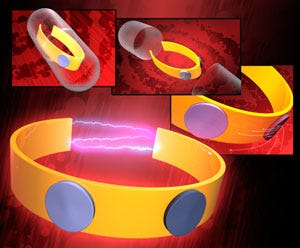April 30, 2013
|
The ingestible biosensor would be no larger than an ordinary medication tablet. |
Last year, the FDA approved Proteus Digital Health's ingestible biosensor for monitoring drug compliance. The technology blurred the line between the world of pharmaceuticals and medical devices in the way that no medical device had before. Unlike combination products such as drug-eluting stents, the device illustrates the convergence of sensors, apps, and wireless technologies exemplified by the consumer devices such as smartphone and tablets. And the swallowable Proteus biosensor is able to offer that functionality in a computing system made out of ingredients found in food: silicon, copper, and magnesium. The biosensor powers itself in a manner similar to a potato battery.
As digital health commenter David Lee Scher, MD notes, the Proteus device "provides a firm foundation for development of offshoot technologies." Now, researchers at Carnegie Mellon University are making good on that prediction by developing another edible electronic medical device. The degradable device, which is no larger than a common pill, makes use of an inexpensive non-toxic sodium-ion battery.
The biosensor developed at Carnegie Mellon makes use of a shape-memory alloy that enables it to expand once inside of the body. The ingestible biosensor could fuel drug-delivery systems or biosensors. In the former case, it could be used to deliver large protein molecules via the small intestine.
The biosensor could also serve as a platform to power electronics in various other medical devices. Similar to the Proteus smart pill, the device is made of biocompatible materials found in the human diet. Specifically, it makes use of a sodium-ion electrochemcal cell and flexible polymer electrodes. The device's battery has a lifespan of approximately one hour. It is expected to be expelled from the body within 18-24 hours after ingestion.
Related Content:
Brian Buntz is the editor-in-chief of MPMN. Follow him on Twitter at @brian_buntz.
About the Author(s)
You May Also Like



